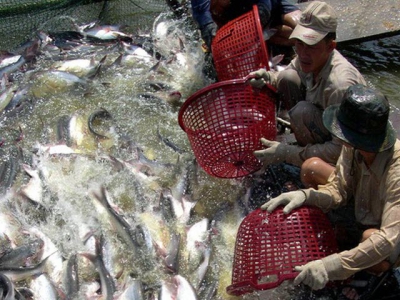Adoption of high technologies needs promoting for sustainable agriculture

Aquaculture is more and more developing and plays an important role in the world. The global aquaculture production is currently above 82 million tons. Of which, Vietnam has more than 4.2 million tons, standing in fourth place in the world, and the Mekong Delta accounts for about 70 percent of the total farming area and production of the country.
Farmers harvest Tra fish in the Mekong Delta. (Photo: SGGP)
On March 30, the conference “Sustainable development of the Mekong Delta - agriculture, aquaculture, and environment under climate change" was held at Can Tho University, with the attendance of Mr. Shimizu Akira, Chief Representative of the Japan International Cooperation Agency (JICA) Vietnam Office, and leaders of institutions and provinces in the Mekong Delta.
At the conference, the presentations of scientists evaluated the impacts and proposed solutions to help the agriculture and fisheries sector adapt to climate change. Accordingly, the rainy season in the Mekong Delta is expected to shorten, whereas the dry season will last longer, aggravating the shortage of fresh water, and increasing saltwater intrusion.
According to Professor Ishimatsu Atsushi, JICA’s Academic Advisor, the Mekong Delta is one of the most vulnerable deltas to climate change in the world. To develop sustainable agriculture and fisheries, a new approach is required in the spirit of Resolution No.120. It is essential to promote integrated planning, application of information technology, and support for the participation of relevant parties. Particularly, it requires a detailed assessment of climate change in the future, thereby, proposing suitable models for changing conditions in the spirit of following the will of nature.
Scientists also said that the Mekong Delta needs to shift from concentrating on the production of rice only to diversified agriculture, linking to market, quantity, and quality, especially the application of high technologies associated with the value chain; respecting the laws of nature, choosing a natural, environmentally friendly, and sustainable adaptation model.
Prof. Dr. Ha Thanh Toan, Principal of Can Tho University, said that Resolution No.120 of the Government outlined the importance of the region in agricultural and fishery production, food security assurance, and its significant contribution to the country’s total export value. At the same time, it also raised the challenges that the Mekong Delta has to face as this region is sensitive to changes in nature.
To solve those challenges, contributing to the sustainable and prosperous development of the Mekong Delta, it needs to proactively adapt to climate change, promote its potentials and strengths, convert challenges into opportunities for development, ensure a stable and well-off life for local people, as well as preserve the unique traditional cultural values of the region. Particularly, proper investment in the development and application of science and technology plays a significant role.
Có thể bạn quan tâm
 Vietnam expects to export US$10 billion of fruit, vegetables in 2030
Vietnam expects to export US$10 billion of fruit, vegetables in 2030 Vietnam targets to export fruits and vegetables worth US$8-10 billion by 2030, according to a scheme for the development of the fruit and vegetable processing
 Vietnam Q1 coffee exports seen down 17% y/y, rice down 30.4%
Vietnam Q1 coffee exports seen down 17% y/y, rice down 30.4% Vietnam's coffee exports in the first three months of the year are estimated to have fallen 17% from a year earlier to 428,000 tonnes
 Vietnamese poultry find way onto more foreign plates
Vietnamese poultry find way onto more foreign plates Apart from maintaining the domestic market, Vietnamese poultry businesses are seeking ways to expand their reach to foreign markets like Myanmar, Japan